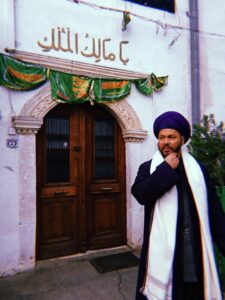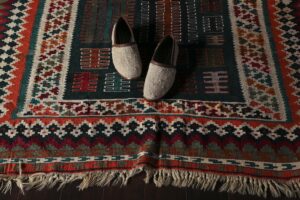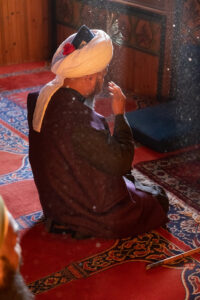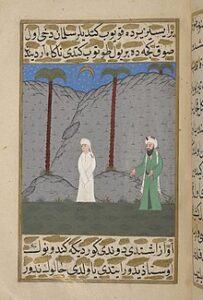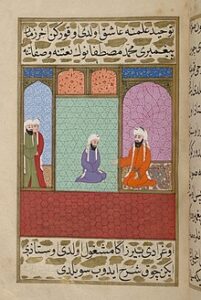Finding Holy Prophet AS
Salman Al Farisi Hazretleri worked as a slave for several years and was unable to continue his quest to find the Holy Prophet (AS) or even hear about him, as the life of a slave was very difficult and they could not get news or information as easily as free men. This was during the jahiliyaa (time of ignorance) before the spread of Islam in Arabia: slaves were treated no better than or sometimes worse than animals, or possessions that their owner could break or even destroy. The mission of the Holy Prophet AS to spread peace and establish the justice of Allah SWT on earth would change this in the future, but until then, slaves were not considered equal human beings. Allah SWT blessed Hazrati Salman in getting closer to the holy city of Medinah by changing his situation: he (HZ) was given to the nephew of his first master, who was from the tribe Banu Qurayzah, a group of Jews who lived in Yathrib (the old name of Medinah). Salman Al Farisi was pleased to discover that Yathrib, or Medinah, was a city of palm trees just as had been described to him by his former Christian teacher. After his new master took him there, one day he overheard his master saying he was angry at the Arabs in Medinah because they were gathering to meet a man that was said to be a Prophet of Allah SWT. Salman Al Farisi narrates what happened next:
“I felt hot flushes as soon as I heard these words and I began to shiver so violently that I was afraid that I might fall on my master. I quickly got down from the tree and spoke to my master’s nephew. “What did you say? Repeat the news for me.”
My master was very angry and gave me a terrible blow. “What does this matter to you? Go back to what you were doing,” he shouted.
That evening, I took some dates that I had gathered and went to the place where the Prophet (S.A.W.) had alighted. I went up to him and said:
“I have heard that you are a righteous man and that you have companions with you who are strangers and are in need. Here is something from me as Sadaqah (charity). I see that you are more deserving of it than others.”
The Prophet (S.A.W.) ordered his companions to eat but he himself did not eat of it.
I gathered some more dates and when the Prophet (S.A.W.) left Quba for Madinah, I went to him and said: “I noticed that you did not eat of the sadaqah I gave. This however is a gift for you.” Of this gift of dates, both he and his companions ate.”
These miraculous signs confirmed what Salman Al Farisi HZ had been told by his Christian teacher about the final Prophet (AS) that would be coming. He only needed to see one more sign to confirm that Holy Prophet AS was in fact the man that his teacher spoke about: the birthmark, the seal of Prophethood.
“Then I came to Rasulullah ﷺ when he was in Baqi’ al-Gharqad, where he had attended the funeral of one of his companions and he was wearing two shawls and was sitting among his companions. I greeted him with salaam then I moved behind him, trying to look at his back to see the Seal that my companion had described to me. When Rasulullah ﷺ saw me going behind him, he realized that I was trying to find confirmation of something that had been described to me, so he let his rida’ (shawl) drop from his back, and I saw the Seal and recognized it. Then I embraced him, kissing (the Seal) and weeping, and Rasulullah ﷺ said to me: “Turn around.” So I turned around and I told him my story as I have told it to you, O Ibn ‘Abas.”
 The date grove of Hazrati Salman Al Farsi RA
The date grove of Hazrati Salman Al Farsi RA
After telling his story to Holy Prophet ASA, Salman Al Farisi was still unfortunately in slavery. After he (HZ) was unable to participate in the battle of Badr because he was still owned by his master, Holy Prophet AS told him to ask his master how much it would cost to buy his freedom. Salman HZ did as he was ordered and the master replied: a large amount of gold and 300 date palm seedlings, that he said must survive to maturity (meaning that if any of the young palm trees died, Salman would not be granted his freedom). The Holy Prophet AS asked the other Sahabis to help their brother Salman, and each of them brought 10 or 20 or even 30 date palm seedlings to contribute to Salman’s (HZ) freedom. Holy Prophet AS told Salman to dig the 300 holes and then he (AS) came and planted every single one of the 300 seedlings himself with his own mubarak, holy hands, saying Bismillahirrahmanirrahim each time. There was still the matter of the gold which Salman worried about, but Holy Prophet AS gave him a gold piece the size of an egg that he had received from one of the battle victories against the enemies of Islam. Salman was concerned that it wouldn’t be enough, but Holy Prophet AS assured him it would be, and when he took it to to the market to sell it, he found it was worth twice the debt he owed: he was able to buy his freedom with the gold from Holy Prophet AS and every single palm tree survived and thrived, with the touch of the Holy Prophet AS.
Serving Holy Prophet AS and Allah SWT
After the Holy Prophet AS freed Salman Al Farisi HZ, he proved to be one of the most unique and intelligent Sahabis. He was an Ajam, or non-Arab, and therefore he brought a new way of looking at things and new skills that the Arabs had not seen before. One of the greatest battles in Islam, Khandaq, was won because Allah SWT blessed Salaman Al Farisi with an idea for a strategy to defeat the Quraish and defend the city of Medinah against the enemies of the Holy Prophet AS. Because he was a Persian, he had seen strategies for fighting used in the Persian Empire and unknown to anyone in Arabia. He told the Holy Prophet AS to dig a trench (khandaq) around the city in order to create a defense against the invaders.
“The course of the trench or Khandaq was carefully planned with Salman Al Farisi RA advising on the width and depth. Rasulullah ﷺ made each section of the community responsible for a part of the trench. It was a massive undertaking. The work was strenuous and everyone, including Rasulullah ﷺ, dug and shifted the earth and boulders while chanting to keep their morale and spirits high. Salman Al Farisi RA being fit and strong and used to such hard labor is said to have done the work of ten men. While each section of the Muslims sought to claim Salman Al Farisi RA as its own, Rasulullah ﷺ was moved to say, “Salman is one of us, the people of (my) household.”
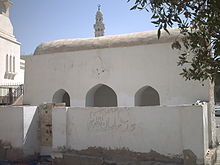 The Mesjid of Salman Al Farsi RA in Khandaq
The Mesjid of Salman Al Farsi RA in Khandaq
Not only did Holy Prophet AS claim Salman Al Farisi, an ajam, as part of his household- the Ahlul Bayt, but the khandaq strategy was a success and the enemies retreated, exhausted from trying to break the defenses of the Muslims. Along with being a fierce warrior and military strategist, Salman HZ was also widely known for his intelligence and reputation as a scholar: he had been living close to Holy Prophet AS for years and years and had taken every opportunity to soak up knowledge and spirituality from the sunnahs of Holy Prophet AS:
“As a scholar, Salman Al Farisi RA was noted for his vast knowledge and wisdom. Saidina Ali RA said of him that he was like Luqman the Wise. And Ka’b al-Akbar said, “Salman is stuffed with knowledge and wisdom – an ocean that does not dry up.”
Salman Al Farisi RA had knowledge of both the Christian scriptures and the Qur’an in addition to his earlier knowledge of the Zoroastrian religion. Salman Al Farisi RA in fact translated parts of the Qur’an into Persian during the lifetime of Rasulullah ﷺ. Salman Al Farisi RA was thus the first person to translate the Qur’an into a foreign language.”
During the life and after the veiling of Holy Prophet AS, Salam Al Farisi HZ served Holy Prophet AS by carrying the message of Islam even to those that he was forced to fight with in battle, taking several days to offer them the message of Islam and protection under the Khalifa of Rasullullah if they declined to become Muslims. Only when they continued to show aggression after his merciful gesture did he order their fortress to be conquered. Through acts like these and many other good deeds and service that he performed for Holy Prophet AS he also became known as “Salman the Good”. Eventually he (HZ) was chosen to be a governor in an area called Al Madain, near Baghdad, Iraq. He (HZ) lived amongst his people as a “servant leader”, giving his salary as governor to the poor and feeding himself only with money he earned with his own hands, harvesting dates or making palm leaf baskets. He (HZ) preferred to live a simple life and even refused to sleep inside a house or any kind of shelter until someone insisted that they build him a very modest house that wasn’t even tall enough for him to stand up in. He endured the hardships of the dunya because of his love for akhirah and desire to please Allah SWT. He was veiled in the 35th year after hijri and buried near Baghdad Iraq, where he served loyally and righteously as governor, for the khilafat of Hazrati Umar RA.
As Osmanli Naksibendis we are very honored to be under the feet of our Seyhs, who are connected to these great Sahabis like Hazrati Salman Al Farisi and Hazrati Abu Bakr AsSiddiq. May we always strive to please them and Holy Prophet AS and follow their example in doing hizmet for the sake and pleasure of Allah SWT.


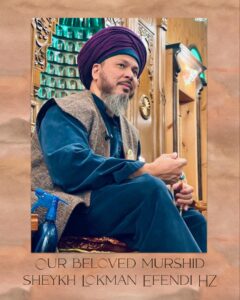
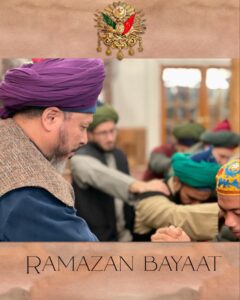 Soup is a long standing tradition of iftar as it is recommended in the sunnat of Holy Prophet AS. Lentil soup is also an old tradition of dervishes as a daily meal. The Osmanli Dergahi lentil soup is some of the best in the world!
Soup is a long standing tradition of iftar as it is recommended in the sunnat of Holy Prophet AS. Lentil soup is also an old tradition of dervishes as a daily meal. The Osmanli Dergahi lentil soup is some of the best in the world!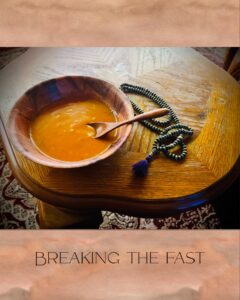
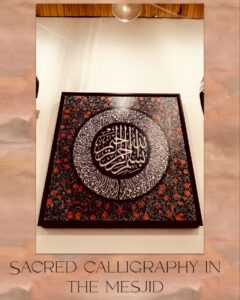




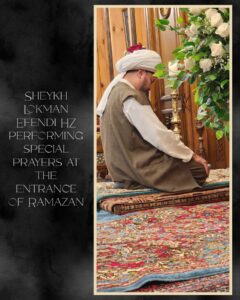
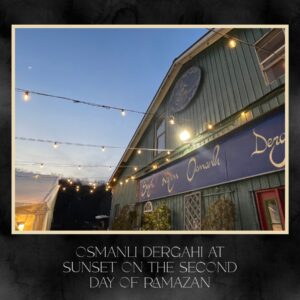
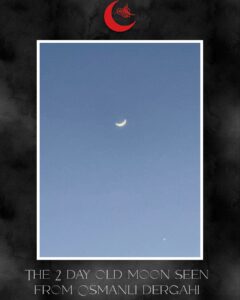
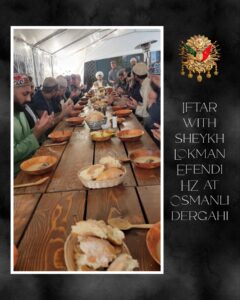
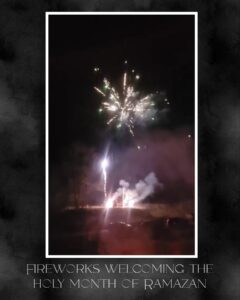
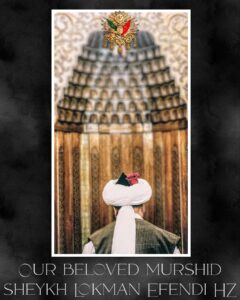

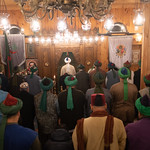

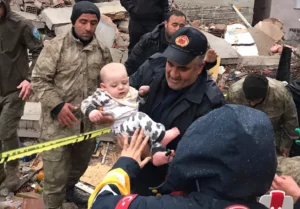
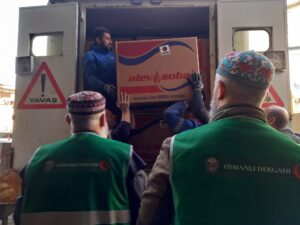
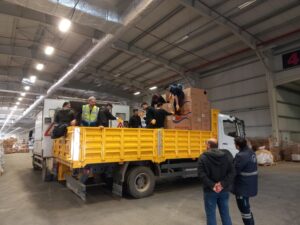


 The date grove of Hazrati Salman Al Farsi RA
The date grove of Hazrati Salman Al Farsi RA The Mesjid of Salman Al Farsi RA in Khandaq
The Mesjid of Salman Al Farsi RA in Khandaq

